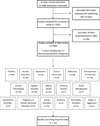The Efficacy of Cognitive Behavioral Therapy: A Review of Meta-analyses
- PMID: 23459093
- PMCID: PMC3584580
- DOI: 10.1007/s10608-012-9476-1
The Efficacy of Cognitive Behavioral Therapy: A Review of Meta-analyses
Abstract
Cognitive behavioral therapy (CBT) refers to a popular therapeutic approach that has been applied to a variety of problems. The goal of this review was to provide a comprehensive survey of meta-analyses examining the efficacy of CBT. We identified 269 meta-analytic studies and reviewed of those a representative sample of 106 meta-analyses examining CBT for the following problems: substance use disorder, schizophrenia and other psychotic disorders, depression and dysthymia, bipolar disorder, anxiety disorders, somatoform disorders, eating disorders, insomnia, personality disorders, anger and aggression, criminal behaviors, general stress, distress due to general medical conditions, chronic pain and fatigue, distress related to pregnancy complications and female hormonal conditions. Additional meta-analytic reviews examined the efficacy of CBT for various problems in children and elderly adults. The strongest support exists for CBT of anxiety disorders, somatoform disorders, bulimia, anger control problems, and general stress. Eleven studies compared response rates between CBT and other treatments or control conditions. CBT showed higher response rates than the comparison conditions in 7 of these reviews and only one review reported that CBT had lower response rates than comparison treatments. In general, the evidence-base of CBT is very strong. However, additional research is needed to examine the efficacy of CBT for randomized-controlled studies. Moreover, except for children and elderly populations, no meta-analytic studies of CBT have been reported on specific subgroups, such as ethnic minorities and low income samples.
Keywords: CBT; comprehensive review; efficacy; meta-analyses.
Figures
References
-
- Babcock JC, Green CE, Robie C. Does batterers' treatment work? A meta-analytic review of domestic violence treatment. Clinical Psychology Review. 2004;23:1023–1053. - PubMed
-
- Baker GA, Brooks JL, Goodfellow L, Bodde N, Aldenkamp A. Treatments for non-epileptic attack disorder. Cochrane Database of Systematic Reviews. 2007;1:CD006370. - PubMed
-
- Beck AT. Cognitive therapy: Nature and relation to behavior therapy. Behavior Therapy. 1970;1:184–200.
-
- Beltman MW, Oude Voshaar RC, Speckens AE. Cognitive-behavioural therapy for depression in people with a somatic disease: meta-analysis of randomised controlled trials. The British Journal of Psychiatry. 2010;197:11–19. - PubMed
Grants and funding
LinkOut - more resources
Full Text Sources
Other Literature Sources
Medical


